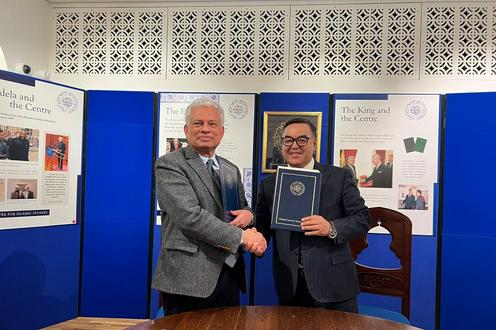The Center for Islamic Civilization (CIC) and the World Society for the Study, Preservation, and Popularization of Uzbekistan’s Cultural Heritage (WOSCU) have presented the Oxford Centre for Islamic Studies with a unique facsimile of pages from the Kattalangar Quran, as well as album books from the series “The Cultural Heritage of Uzbekistan in the World’s Collections.” The announcement came via WOSCU’s press service.
A delegation led by Firdavs Abdukhalikov, director of the CIC and chairman of WOSCU’s board, visited the Oxford Centre for Islamic Studies as part of Uzbekistan’s Cultural Heritage Week in London.
The meeting with the Centre’s representatives and scholars was attended by Ravshan Usmanov, Uzbekistan’s ambassador to the United Kingdom; Uygun Gafurov, rector of the International Islamic Academy of Uzbekistan; Shovosil Ziyadov, director of the Imam Bukhari International Scientific Research Center; Muzaffarkhon Janiyev, director of the Imam Tirmizi International Scientific Research Center; and Jamoliddin Karimov, director of the Imam Maturidi International Scientific Research Center.
Uzbek scholars presented a report detailing the country’s efforts to preserve, study, and popularize its cultural heritage, along with updates on recent academic research and developments in international cooperation in this field.
Representatives from the Oxford Centre for Islamic Studies introduced the Atlas of the History of the Islamic World project, which is being developed in collaboration with several countries. The project highlights each region’s contribution to Islamic civilization, significant discoveries, the lives and works of scholars, and the influence of Islamic civilization on global science.
The parties agreed to collaborate on a volume within the project focusing on Central Asia’s role in the development of Islamic civilization. Following the meeting, memorandums of cooperation were signed between the CIC and several international research centers, including the Oxford Centre for Islamic Studies.
The event also featured an exhibition showcasing books and albums published in recent years.
“Uzbekistan is an ancient country with a rich history and unique cultural heritage. I have visited Uzbekistan many times. In recent years, your country’s engagement with the global community has grown significantly. The leadership of New Uzbekistan emphasizes that the doors are open to all foreign partners, including us, international scholars and researchers. I am confident that today’s discussions will yield the expected results and foster mutually beneficial cooperation,” said Farhan Nizami, director of the Oxford Centre for Islamic Studies.
At the conclusion of the meeting, the Uzbek delegation visited the Bodleian Library in Oxford, one of the world’s oldest libraries, where they viewed rare manuscripts connected to Uzbekistan, including a copy of Khamsa bearing the personal signature of Alisher Navoi.
“Uzbekistan is a land of great scholars, poets, and thinkers. In particular, the manuscripts transcribed during the lifetime of the great Alisher Navoi are among the treasured assets of our library. Such invaluable works can rightly be called the heritage of all humanity,” noted Nicholas Contovas, curator of the Bodleian Library’s Eastern Manuscripts Department.










